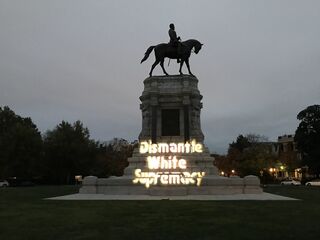Personality
We Do Not Concede, Nor Do We Condemn (Part 2)
Part 2: Chronicling the fight against white supremacy and radicalization.
Posted October 13, 2020

This post is Part 2 of a three-part series. It offers an excerpt of an interview with CEO of Life After Hate, Sammy Rangel, that appeared in my book, Leadership: Performance Beyond Expectations.
Proximity Matters
"Proximity matters—if you remove yourself from a harmful environment you are now exposed to new environment, and that can leave you vulnerable. People who have similar unmet grievances and trauma often bond, and some might be radicalized already, and recruit their new friends. It can also happen organically—this sub-group says, 'Hey, we need to do something about this,’ and look for a solution and that can be engaging with extremist groups in some way. Social media has enabled that process a lot. Take the case of a young, male white supremacist who walked into a black church in Charleston in 2015 and just started shooting. The guy had never met another white supremacist, never been to a party, never been to a function, never been to a meeting where he chatted to one, never stood in an alley and smoked a cigarette with one. Nothing. His radicalization happened 100% online.
"On the Internet, the process of radicalization can happen in light speed compared to pre-Internet days: What once took months or years can now take minutes or hours. You can consume content extremely fast. Take the 2016 US elections: It wasn’t won by Republicans or Democrats but people who understood that they needed to start a kind of culture war (a phrase which could be interpreted by some groups as a dog whistle to, or implied threat of, a race war). We had very high-ranking individuals in our Administration saying that if you stand for civil rights you are unAmerican—that civil rights were an attack to undermine American values. These kinds of things are what lead to radicalization. How can average Joe America defend against that kind of radicalization if they are completely blind and ignorant to the fact that it is happening?
"One of the remarkable cases and a referral to us from the FBI was a young man whose father was in the police force. In this case, the kid seemed to be a danger to himself and others. Based on his online activities, the FBI would have had no alternative but to arrest him if they hadn't had the option of referring him to Life After Hate. Someone had tagged him in a Black Lives Matter anti-police rally online, which led to other related videos popping up on his social feed. Then of course Blue Lives Matter pops up and he felt that Blue Lives Matter were really trying to protect his dad while Black Lives Matter were trying to kill his dad. Those were his words. The more he consumed Blue Lives Matter content, the stronger against Black Lives Matter he became. White lives versus black lives - that is what it ended up getting to in his head. Online, people actually thought this kid was a danger which is what bought the attention of the FBI to him (and why he was referred to us). But offline he was very mild, meek, isolated, and an introverted kid. But he could have been triggered into taking action."
Just Banter?
"It starts out as banter. It doesn’t start off as ‘white supremacy’ but with a comment—‘Man that’s f--ked up, you know that happened to us too, that’s BS, we’re with you.' That kind of thing. Then, ‘Hey we can do something about this’. You’re there online as a radicalizer to hold a position, which is why online banter is so effective for engagement. The only person who loses out in that scenario is the person defending civil rights, because they don’t get to take control of the conversation—they are always on the defense."
Addictive vs. Criminal Personalities
"We see a lot of substance abuse—but caution your readers that this is not the only reason or way to be in these groups.
"In Formers Anonymous we say that an addictive personality is different from a criminal personality. A very basic explanation; you could say that addiction personality lives in emotions and you could say that criminal personalities live in a cognitive state. I’m probably as an addict going to kill myself—but as a criminal personality, I’m more likely to kill someone else. It’s a very different energy. You can have a person who lives with both of those things but it’s no longer two separate things when they combine—it becomes a third—a hybrid. And then what happens, when you bring those two kinds of personality together? You have this very intense human being who is capable of just about anything."
The final part of this three-part series will be published next week. In the meantime, visit the following links for more information:
- Life After Hate
- We Counter Hate
- Enzinna, W. Inside the Radical, Uncomfortable Movement to Reform White Supremacists. Mother Jones.
To find out more, click here.


